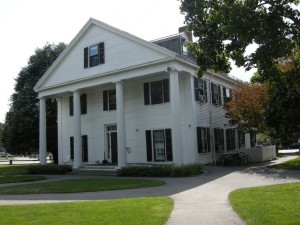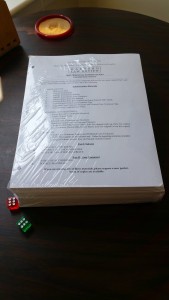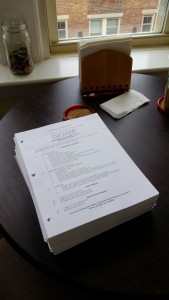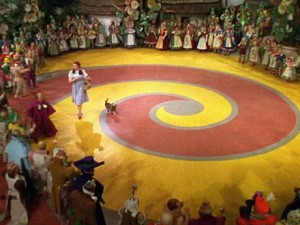Well ladies and gentlemen, this marks the official 100th post of this blog.
Its kind of crazy to think about. When I first started posting in Denmark nearly three years ago I never imagined that this blog would be around for 100 posts. And, if you told me that my 100th post would be wrote to reflect on the end of my first year of law school, Harvard Law School, I would have probably laughed in your face. I guess this is all to say that you really never can predict what the future holds. This blog is a testament to that, if nothing else. And while the face, name, and even web address have changed over the past three years, the blog, was, is, and always will be – by me, for me. In essence, the blog is me.
So what does the future hold for Dinosaur Bear? Well, as I just mentioned, who knows? I’ll be writing a sort of pseudo “this is where the blog is” post next, but this post is a celebration of where I have been. Rather than talk about all the past posts, which seems to be a common thing to do on “100th post”-posts for blogs, I want to talk about the past law school year. While not technically a calendar year, the past academic year has been a crazy wild ride. If you follow along, you’ll know that I originally intended to share my experiences at the year progressed. Well, the “First Week” of law school post turned into the first month, and then finally settled on the first semester. Well, I didn’t really kind myself and decided to just wait until the end of the second semester before I posted a summary post, and the 100th post was quite fitting. However, a lot of my posts serve the same purpose of checking in, so these “summary” posts really aren’t needed that often anyways.
If you’ve been reading this blog since I started law school, you’ll undoubtedly have seen some of the things I’ve struggled with. However, and this is cliché, but truthfully, even in reading these posts you haven’t heard the half of it. So, for my 100th post celebration, I’d like to discuss 1L (One-Hell) at Harvard Law, where I am, where I am going, and even a bit of what I am thinking (I know, be scared). Unlike many of my posts, don’t expect a lot of pretty pictures, which I know is a bit sad for my 100th post, but hey, I put a big sparkly “100” up top, so just scroll up to that if you get bored.
So, getting started. If I had to sum up my feelings about 1L in one image, then there is no image in existence that sums up my feelings better than this one:
Yep. No more words required.
But, this blog would be rather boring if I just summed up a year of my life with an image and no story. So we’ll get into the nitty-gritty. However, before I do that, I’d suggest that you at least skim these posts: Law School 101, Law School 102, Lawyerdom 101, and maybe even Ivy League 101. Outside of that, I’ll assume you at least remember the basics.
So, one thing I remember back when I was a 0L was all the current law students talking about how 1L was just something you have to experience. Well, now that I am no longer a 1L (!) I have to say its true. I also have to say that at a school like Harvard, which is known for being especially hard and competitive (Top schools expect more of their students, generally speaking) the 1L experience is worse than average. A lot of that has to do with the fact that we have a graded LRW, in addition to seven freaking doctrinal classes, and an elective our first year. Most law schools don’t even come close to loading up their 1Ls like that. But again, I am not at “most law schools,” and that, was a big part of the problem.
I’ll be real, the 1L workload is worse than I was told it was. Again, to some extent I think this stems from me speaking to people at lower ranked schools (where the workload is not as intense). However, I think 1L workloads just generally suck across the board. Here is a nice visualization:
That is my supplementary reading. As in, that picture doesn’t even show my casebooks. This is the extra (required, of course) reading that I had to do in addition to the cases. And oh yes, this was one semester, not the entire year. Nope, that stack of paper is from this Spring semester – and it doesn’t even include assignment packages (a la the 80 page record from LRW). These are just the supplementary readings from three of my five classes. So, to see a year’s worth of supplementary readings, you can approximately double that stack. Then you’d also need to add in the casebooks, which are generally around 1200 pages a piece.
You get my drift.
I recently read that the average 1L reads around 3.7 million words. Three. Point. Seven. Million. Words. Let that sink in for a second. That is realistically more reading than I did in the entirety of my kindergarten through undergraduate career (excluding my thesis – which still wasn’t anywhere near 3.7 million words worth of reading). For reference, the epic War and Peace by Leo Tolstoy clocks in at 561,093 words. So I sort of read War and Peace 6.5 times. Yeap.
I’m going to go out on a limb, and risk arrogance, and say that, if you are not a 1L – you do not comprehend the amount of material you have to digest as a 1L. You just don’t. Especially when you have to take that stack of material, and learn it to the point of being able to condense it all down to a 3-8 hour exam where you don’t know what it is going to cover until the timer starts counting down. To be blunt, it sucks. It really, really, sucks.
So how about that second round of exams? Well, on the whole I feel better than I did last time. Last time I had one exam I felt bad about (my first law school exam ever) and I did relatively poorly on it. Not failing, but not great either. The rest of the exams I received the grades I wanted. This time around, I feel much more neutral about all my exams, which I am hoping translated into getting the grades I wanted, without that one problematic grade. That one below average grade would be much easier to explain, so long as it stays as one below average grade. But given how slowly grades come out for 1Ls, it’s hard telling how long it will be before I know what I made. But the outcome isn’t as important for the experience for the purposes of this post.
And again, I say. It really, really, sucks.
[Though I do have to give props to my Human Rights professor – who gave us an exam about a zombie apocalypse – I am being completely serious – no it was still hard, but the hypothetical was cool]
I’ve never been a “test taker.” Give me a project, give me a paper, make me present in front of 100s of people, but don’t ask me to take a timed exam. Sure, can I do it? Yes. I scored above the 99th percentile on the LSAT. However, it did not come quick, and it did not come easy. So, when you tell me “Hey your entire grade is going to be based on a single, timed exam and there is nothing you can do to ameliorate that” then I struggle. Then, when you curve my grade against very intelligent and/or driven people (some of whom are good “test takers”), I run into some real problems.
I can definitively say, that I worked harder in 1L than I have ever worked in an academic setting before. I spent hours and hours, working, reading, compiling, applying. And at the end of the day, I came away largely average. It’s odd, I’d spent the last several years before law school being anything but average, but here I am, average. At least so far. There are two years left. But my point is that in law school, especially a law school like Harvard, what might be the A+ elsewhere, is the C here (not that we have A’s or C’s, but you get my drift). And that takes a lot to get used to. But, to be fair, average at Harvard, isn’t really average at all.
So, looking back on 1L as a whole. I still think the picture above sums it up best. But here are ten things that I’ve learned in 1L (not legal – don’t worry) that standout most in my mind. While I’ve numbered them from one through ten, they are not really “ranked” but rather simply appear in the order I thought of them.
1 – Successful people are often the most insecure.
2 – Law schools are bitterly divided between the “Ivory Tower,” “Fortune 500,” and “Down with the Man” crowds.
3 – Sometimes you really can judge a book by its cover.
4 – Lawyers probably lie, cheat, and abuse substances because they work in really shitty profession that can turn “good” people into “bad” people.
5 – The rich lawyer, who is rich by no other means than being a lawyer, is at most, .01% of all lawyers.
6 – Who you know trumps what you know in law, possibly more-so than any other profession in existence.
7 – Law schools claim to care about your mental health, but in practice they know they need to turn most of you into sociopath-like drones.
8 – Law school exams are one of the cruelest exam formats on the face of the Earth, they are designed to break you down and confuse you, not to help you learn.
9 – Many law professors often care very little about the common man, and as such many of their students stop caring as well.
10 – Saul Goodman is actually a really amazing lawyer (I mean like, absurdly good), criminal activities aside.
With that said, where do I go from here? Well, that is actually a question that has weighed pretty heavily on my mind these past couple of weeks. You see, a big, and I mean BIG part of going to law school is spent fretting about 1L. As I mentioned a good while ago:
1L: The first year they scare you to death
2L: The second year they work you to death
3L: The third year they bore you to death
And thus far, those are holding quite true. 1L was horrifying in many ways, and yet 2L is looking to even more busy, if not as scary. So, when you are suddenly looking at 1L in the rear-view mirror, it makes figuring out what to do kind of a challenge. 1L is essentially on rails, whereas your 1L summer, 2L, 2L summer, and 3L are largely up to you (and reality, and luck). Its no secret that in the game of life, I am a really shitty decision maker. So moving into the “freedom” of 2L is a bit of a hardship for me. But, as always, time marches on. So here is a snapshot of what is going on.
First off, if you know much about the law school process, you’ll know that I am now in the period between the end of 1L and the beginning of 1L summer where law reviews beginning their recruiting process. Yes, LAW REVIEW. The very words send shivers down the spine of 0Ls and 1Ls (2Ls and 3Ls are either on law review, give no shits about law review, or pretend to give no shits about law review and are deeply bitter they didn’t make it on).
But what the hell is a law review? Well, here is a Wikipedia page if you really care. But in essence, a law review is sort of like an academic journal that focuses on legal scholarship. Some of them are “Generalist” in that they cover pretty much any topic in the legal realm, whereas others are “Specialist” in that they only focus on a particular subset (e.g. Immigration, Environmental, Sports, etc.). Some of them refer to themselves as a law review, for example “Environmental Law Review,” whereas others call themselves a journal, for example the “Journal of Law and Technology.” To my knowledge, there is no substantive difference between a “law review” and a “law journal,” they are both scholarly journals that focus on law. Like everything in law, these law reviews are studiously ranked, and with a higher rank comes higher prestige. Setting atop this massive pile is none other than the Harvard Law Review. While the University of Pennsylvania had the first law review (1852), Harvard’s (1887) law review is the most cited (and thus most prestigious) law review in existence. The Harvard Law Review is the top-ranked generalist journal, though many specialist journals also exist at HLS, some of them, such as the the Harvard Environmental Law Review (ELR), are the top-ranked journal in their specialty field.
The point however, is that the Harvard Law Review, commonly referred to as HLR, is an organization with a near cult-like status among law students at Harvard (and beyond – some people leave full scholarships at other law schools just to try to get on HLR). Its been home to a multitude of extremely famous people, such as that Barack Obama fellow. The Supreme Court of the United States loves HLR. It is, without a doubt, the numero uno law review. As such, they can’t let just any ole’ pleb walk into their doors.
And I do mean that literally. HLR has its own house (Gannett) on campus. No seriously.

(Though to be fair, they share it with Harvard Defenders, The Prison Legal Assistance Program, and the Pro Bono Program – but make no mistake, its mostly HLR’s)
There are more than a few photos of Obama sitting on the front porch of Gannett. Which isn’t surprising, considering that it was built in 1838.
But, back to my point. To get onto HLR is an extremely arduous process. I mean, smash your face into the wall difficult. Many law reviews aren’t just open to anyone. They have what are called “Write On” competitions. For example, ELR has a write on competition (nowhere near the size of HLR’s) which knocks out a bit over half of the applicants. HLR however, takes things to a whole new level. Only about 10% of those who start the competition will ultimately be selected to be on HLR.
As for the competition itself?
Yes, that entire packet is the assignment. That is how you pick it up, all shrink-wrapped nice and fancy (Public Interest Auction dice shown for scale). The HLR write on competition is one week long, beginning just 48 hours after 1Ls finish their exams. It consists of hundreds of pages, but ultimately boils down to two portions. A case comment – which is essentially an advanced essay about a recent SCOTUS decision, and a subscite – which is error checking (both technically and substantively) a massive article. Then, you need to format it all very precisely, make like 20 copies, and submit it within a 120 minute window precisely one week after the packets were available for pick-up. Its crazy.
It literally eats up the one week of summer that 1Ls normally enjoy, its very hard, the odds are against you, and if you do it and fail, you will have wasted an entire week of your life – for nothing. Its not like you can put “Tried out for HLR and failed” on your resume.
But each year, a massive number of people try out. Why? Prestige. It undoubtedly has advantages. One, it’s HLR, and therefore has a cycle of important people helping important people. Two, it shows that you have the guile to complete the competition. Three, it shows that (in theory) you are even better than the rest of the already exemplary students at HLS. Four, it shows that you can follow instructions to the T (the instruction section of the packet is nearly 100 pages long). Five, it shows that are willing to put in long hours – its not like the massive amount of work ends once you get on HLR – once yo are “in” you have to sign up for 20 out of 30 days, and for each of your “on call” days, you will have a “duty” that takes up between 1 and 10 hours.
So its not like HLR is without benefits. And while most people do it for the big resume boost, there are some (crazy) people who actually enjoy that sort of thing.
However, most of them won’t get on HLR, whatever their reason for trying out.
As for me, I didn’t even try.
I know, I can just sense the palpable “Oh my gosh Taco! But SCOTUS clerkships require HLR! But Vault 10 Firms! But Obama! But All The Cool Kids Do It!” It might seem easy to say that I’ve made a very stupid mistake. In fact, I’ve had people (and by people I mean people in career paths that don’t interest me, or students who are drones) tell me that I just have to try to get on HLR. Why would you ever give up on the chance to be on the top law review in the world and reap all the career benefits that it accords you?
Well, there are actually more than a few reasons.
First of which, I don’t want to do it. No really, I have no desire to actually do the work that HLR requires. While most of my classmates spend all their waking lives worrying about what they “should” be doing, scarily few of them seem to think about what they want to be doing. And, I don’t want to do HLR. Second, most of the benefits that HLR offers (and there are many) are curtailed by my specific situation (I’ll get to that in a second). Third, I didn’t want to spend a week of my life working on the competition when my heart wasn’t in the game. Most people who end up on HLR spend between 10-14 hours a day, for seven days straight to get on HLR. And its not like that is a guarantee, that’s just a minimum.
No thanks.
It’s really that second reason that kept me from trying to get on HLR. See, at the end of the day, there are only 24 hours that we have to work with. I am a person who needs sleep. Like, a lot of sleep. I’ve realized over the past five years that I am willing to sacrifice a lot to ensure that I have a chance to get my (at minimum) eight hours of sleep. It doesn’t mean I always will, but to be happy and healthy, I need a lot of sleep. So, I’m not the kind of person (a la most my peers) who will sacrifice sleep, to the point of only averaging around 2-3 hours a night, just so I can spend all that time on law school things I “should” be doing. Nope. What I should be doing is sleeping, thank you very much.
And thus arises the conundrum. HLR takes up a massive amount of time. And, if that is what you are banking on, its arguably worth it in the end, so long as you don’t let your grades slip. However, there is another thing at the law school that eats up a lot of time, clinics.
And herein is the first “Great Divide” that many 1Ls encounter. Do you devote yourself entirely to HLR, the tried and true, near-guarantee of a firm job and/or clerkship? Or do you go into a clinic, which is experiential, rather than doctrinal, and put your feet on the ground? Essentially. Do you write and edit documents, or do you help people? That question might seem slanted, but it is really the core of it.
The end of 1L marks a line in the sand, where you either strive for HLR, and top notch grades, and whatever other “traditional” resume builders will make a prestige firm or clerkship more likely, or you throw your cards in the public interest pile and go into a clerkship, where you work with real people doing real things but without all the prestige or critical emphasis on grades. Neither path is wrong, neither path is universally right. They are just two paths, but the thing is, you can’t walk both of them at the same time. And as you progress down one, you’re burning bridges on the other.
At Harvard, you can safely say that the Firm/Clerkship route is the traditional route, the path most followed, the Yellow Brick Road. On the flip side, the Public Interest/Fellowship route is the “other” road that is far less spoken about, the Red Brick Road.
And, if it wasn’t obvious from the post title, you’ll currently find me pondering the first steps of the Red Brick Road.
And one element of that, is doing clinics. I’m signed up for three during my 2L year, the most you can take. And clinics are very time consuming. So much so that to do HLR and a clinic in tandem is impossible with only 24 hours in the day. And after speaking to my advisor in OPIA (Office of Public Interest Advising – I am very fortunate to be going to school with such an office, most law schools just have an OCS – Office of Career Services, which are normally firm-focused) I decided that I didn’t want to waste time trying to write on to HLR when I wanted to do a clinic more anyways, and the clinic would be more beneficial for a public interest job. Besides, I’m perfectly happy on my specialty journal – and plan to stick with it.
So I picked up my HLR write on packet simply to look at it. And then I recycled it.
No great loss.
But what that means in the larger scheme of things, is that I’m playing my cards. And in the words of Kenny Rogers: “You’ve got to know when to hold ’em, know when to fold ’em, Know when to walk away, know when to run.” The good news, is that it moves me towards the future. The bad news is that you can only really show your cards once.
While attempting to get onto HLR is one element of this philosophy, EIP (Early Interview Program) in the Fall is the true “Point of No Return.” EIP is really a glorious thing. Its the largest law school interview program in existence. The firms come and interview 2Ls at the very beginning of the year (August). If you get an offer, they hire you for your 2L summer, which, if you do good, normally leads to post law school employment. Hundreds and hundreds of firms, pay Harvard, yes pay to have the chance to interview HLS students. If the information I found is correct, they pay 700$ for each 20 minute interview they have with an HLS student. Of course the student gets none of that, but my point remains. Most law schools can’t pay firms to show up. At Harvard, the best firms in the world pay, just to be there. Of course these firms are looking for the things I’ve mentioned above – HLR, top grades, traditional endeavors, etc. But generally speaking, unless you’re just really bad at interviews, being at Harvard is a good place to be for firm jobs (i.e. those 160,000$ + bonus, starting jobs you may have seen on the news or read about in my earlier post).
And that is all well and good. But what about people who don’t want to follow the Yellow Brick Road?
Yes, believe it or not there are people out there who are not swayed by 80 hour work weeks spent making old rich white men richer, even for 160,000$ a year plus a 20,000$ bonus to start, even with annual raises with no end in sight.
And I think I’m one of them.
For the “rest” of us, there is no such program. No influx of public interest employers. No mass of organizations paying just to have the chance to interview us. It just simply isn’t there. Because here is a crazy truth. And I’m going to put this on its own line, because it really is that crazy.
It is far, far more difficult to get a public interest job paying 40,000$ than it is to get a firm job where you’ll make 180,000$ your first year and get annual raises.
Because our priorities are just, so amazingly in-line in this country, we pay the people pursuing public interest so little that they can’t afford their loans, and pay the people making rich white men richer more money than they know how to spend – and not only that, we make the public interest jobs harder to get.
Now, VERY fortunately, I go to one of the three law schools in existence that will pay my loans if I go into public interest and make very little money. So I can’t complain about that too much, other than the fact that I will still work far more 40 hours a week, and make so very little in comparison to my peers.
What is complicated, is that “To EIP or not to EIP?” is the question. If you do EIP, and go to a firm you’ve most likely set yourself on a firm path. Why? Well, its for your 2L summer, where you will make between 30 and 40 thousand dollars (in ten weeks) and often those summers result in a job offer after graduation. On top of that, going to a firm shows public interest organizations that you aren’t entirely committed to public interest. If you were, you would have gone to a public interest job your 2L summer (like I am my 1L summer).
On the flip side, if you eschew EIP, then you’ve pretty much just lost the biggest and best opportunity to get into a firm. If you go to a public interest job your 2L summer, firms are going to be hesitant to hire you because they assume you will jump ship for a public interest gig as soon as possible (so basically the inverse of a public interest organization if you went to a firm your 2L summer).
Point being, this is a path divided. A very really path divided. And as “You’ve got to know when to hold ’em, know when to fold ’em, Know when to walk away, know when to run.” You have to make decisions for you, knowing full well the direct and real consequences of how you play your hand. There are, realistically, no “do-overs” here. While coming from Harvard probably removes a true “lock-out,” switching paths is extraordinarily difficult, and can take several years, even from the best schools. So, this is no light-hearted card game, the stakes are real.
And it’s currently the decision I am really grappling with. I’ve already played my cards for my 1L summer, aiming for public interest rather than the private sector. And while 1L summer does matter, its really (read: about 80% of the equation) what you do 2L summer that matters. Up until recently, I was 50/50 between a firm and public interest. However, recent weeks have seen the scale tip towards public interest, which puts me in the solid minority of HLS students.
Now, fortunately I don’t have to decide right now. However, I do have to decide definitively before July 17th at the latest. More realistically, I need to decide earlier. Namely because over the summer the kind of networking I do is directly related to the kind of work I plan on pursuing my 2L summer. For instance, If I wanted to do public interest work, it would be largely pointless to network exhaustively with firm people (and vice versa). Again, there are only 24 hours in the day. Yet, deep down, my gut is telling me that I need a purpose in my work, and so maybe the decision isn’t as hard as it initially seems.
At the end of the day, it really is “You Do You.” The thing is, institutionally, culturally, socially, and financially its all about the Yellow Brick Road with the known-and-loved Emerald City awaiting you at the end. The thing is, the Emerald City is smoke and mirrors, the Wizard of Oz wasn’t. However, to decide to walk down the Red Brick Road is anything but easy, and no one is entirely sure where it takes you. But moving forward, I think that’s where you’ll find me.

For what shall it profit a man, if he shall gain the whole world, and lose his own soul?
~Mark 8:36
___________________________________________
So that is about it for the 100th post. Its been a fun voyage, even if I didn’t always enjoy how time consuming writing each one of the posts has been. I look forward to what the next 100 posts will bring. If the past three years have shown me anything, its hard telling where I will be come post 200. That said, I’m sure it will be one hell of an adventure.
Until next time constant reader,
-Taco






Yay, 100th post! Hopefully, I will catch up with you soon on my blog. Like you said, writing can take up so much time, so I’ve got to get the motivation level up..and find some extra time.
I know the decisions you’re going to be making in the near future will be tough ones. Deciding the future of your career, which in turn, decides decades of your life, is a huge task! However, I know that with your logical, rational abilities mixed with you listening to what will truly make you happen will lead you down the path for you.
Either way, I’ll be here, taking on the adventures right by your side!
You better hurry up! 🙂
Looks like you’ll have plenty of time this summer, I don’t think I’ll be able to blog as frequently.
Yay adventures!